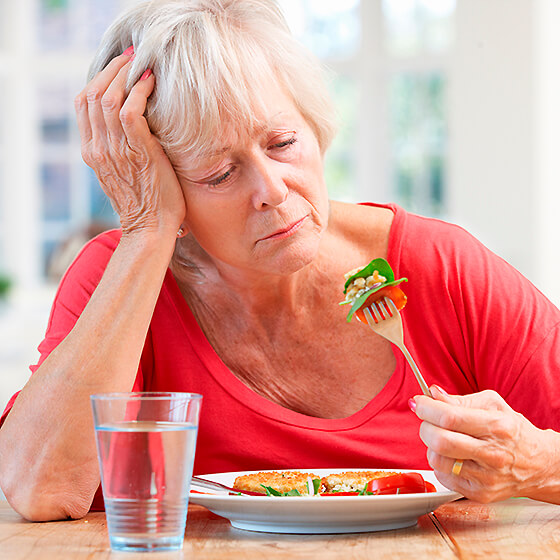As we age our natural physiological and behavioral changes affect our health habits. It is not uncommon for health-based habits such as diet, exercise and sleep to suffer as a result of ageing and age-related health issues. Appetite can suffer because of the slower pace of retirement and a decrease in metabolism and biological functions that drive hunger. This can be natural or common, but the culprit can also be a more serious medical condition requiring treatment. It is important to consult a doctor if there are major changes to eating habits, digestive issues or drastic weight fluctuation. Consider the following medical and non-medical causes of appetite loss and confer with a doctor for assistance in supporting healthy eating habits.
Age-related Conditions that Cause Appetite Loss
Appetite suppression is a common side effect of aging. Older age leads to a lower metabolic rate which decreases their feelings of hunger. As well, being retired can mean a slower pace in life and physical ability decreases with less activity and exercise. This means that seniors will require fewer calories and feel less urgency for eating because of hunger suppression. As you age, there are biological changes to the senses of smell and taste due to the loss of taste buds, directly affecting your experience while eating food by sometimes making it less appealing. Another factor in ageing is its effect on a senior’s physical ability to eat. Dental issues increase with age and those with painful teeth, loss of teeth or dentures may find the act of chewing to be frustrating and uncomfortable. Ensure that if your senior loved one has shown signs of decreased ability or preference for eating that you schedule a visit to their dentist as soon as possible. Other than dentition conditions, their digestive tract may be the issue for their decreased appetite, as ageing affects their ability to effectively digest their food. Conditions such as food sensitivity to types of spicy or acidic foods may make digesting painful and will suppress their appetite. They can also develop intolerances to foods such as gluten or lactose. If your senior loved one is complaining of painful digestion or bowel movements then going to an allergens specialist can clear up what intolerances your loved one has so they can avoid them.
Health Conditions that Cause Appetite Loss
Health-related conditions such as physical dysfunction and disorders affect appetite. Some other common issues are:
- Insufficient energy to cook and clean (possibly due to a sleep condition)
- Side effects from medications
- Dementia symptoms
- Parkinson’s Disease
- Cancer
- Infections
- Mental Health conditions
- Depression
- Anxiety
- Loneliness
- Feelings of being helpless or not in control
The loss of appetite can be emotionally frustrating for both the senior and their caregivers, as it can sometimes be seen as a way that seniors can gain control over their lives when they feel insecure. However, it is important to work closely with specialists to procure the best care for your elderly loved one. Whether you need a doctor to address a medical condition, a dentist to address dentition conditions or a therapist to address a mental health condition, it is valuable to work with your senior loved one so they feel heard and cared for during this process. Allow them the dignity to make choices for themselves whenever possible in regards to their diet and work together to create a solution that supports healthy habits. It is critical to build healthy habits involving appetite in order to achieve a balanced and comfortable life. Next week we will be discussing those solutions in more detail.
We also recommend you check these related posts in our Home Care Services blog:

